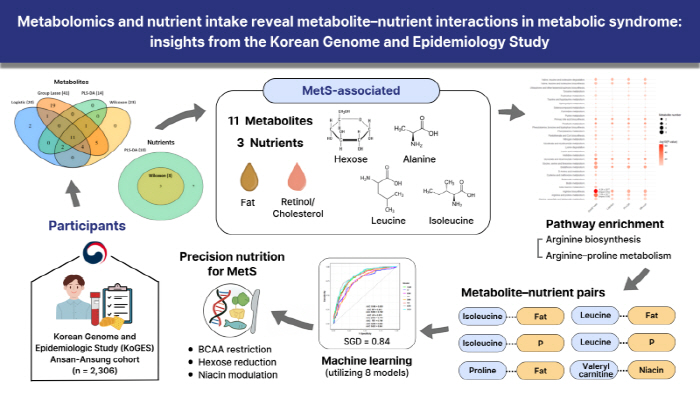New Biometric Indicators of Korean Metabolic Syndrome Found...Arginine metabolic pathway disturbance is a key cause
|
Professor Shin Da-yeon's research team announced the results through a large-scale study of 2,306 participants in the Korean Genome Epidemiology Survey Project (KoGES).
As a result of comprehensive analysis of 135 metabolites and 23 nutrients in plasma, the research team identified 11 metabolites and 3 nutrients closely related to metabolic syndrome.
Among them, hexose, a monosaccharide such as glucose, showed the most prominent association, and showed a strong correlation with actual blood sugar levels.
In this study, it was found that the 'arginine biosynthesis' and 'arginine-proline metabolism' pathways had the most pronounced association with metabolic syndrome. Arginine biosynthesis is the process of making arginine, which is a raw material for nitric oxide (NO), a vasodilator, and arginine-proline metabolism is an amino acid metabolic pathway in which energy metabolism is also involved in blood sugar control. If there is an abnormality in these metabolic pathways, vascular function may decrease.
In fact, previous clinical studies have also reported that the decrease in nitric oxide production due to the lack of arginine in patients with metabolic syndrome is directly related to typical symptoms such as vasodilation disorder, high blood pressure, decreased glucose tolerance, and obesity.
The results of clinical research were proved through systematic and objective data through this study.
Six unique metabolite-nutrient interactions that appear only in patients with metabolic syndrome have also been identified. In particular, patients with metabolic syndrome responded completely differently from normal people in combinations such as 'isoleucine-fat', 'proline-fat', and 'leucine-fat'.
These differences are deeply related to the branch-chain amino acids (BCAA), leucine, isoleucine, and valine. BCAA is an essential amino acid for muscle protein synthesis and energy metabolism. However, in patients with metabolic syndrome, amino acids were abnormally strongly associated with fat intake. It is an important evidence showing the unique metabolic disturbance status of patients with metabolic syndrome.
Based on this achievement, the research team also confirmed the possibility of early diagnosis based on machine learning. A comparative analysis of eight machine learning algorithms, including support vector machines, random forests, and deep learning, using metabolite data in the blood showed a high predictive performance of AUC 0.84. AUC is a representative indicator that evaluates the performance of predictive models in the medical and machine learning fields.
Academia shows such accuracy in large-scale studies using data from more than 2,000 people, indicating that it is possible to diagnose metabolic syndrome with only a simple blood test in the future.
With the support of the Korea Research Foundation's excellent new research, the study was conducted as an international joint study with Kim Min-young, a graduate student in clinical nutrition course (master's course) and a research team in bioinformatics at the University of North Dakota (UND School of Medicine). It was published in the latest issue of the international journal 'Nutrition Journal'.
Professor Da-yeon Shin, who led the study, said, `The scientific findings of unique metabolic characteristics in patients with metabolic syndrome' and `It will serve as the basis for the development of customized nutritional treatments such as BCAA-restricted diet, sugar intake control, and niacin-containing protein intake management according to individual metabolite profiles.'
|
This article was translated by Naver AI translator.





